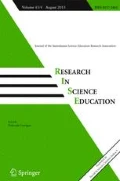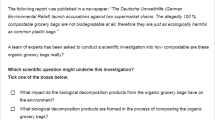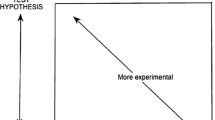Abstract
This paper analyses the epistemic criteria that pre-service teachers consider when assessing the quality of a scientific investigation about friction force. The participants were 71 pre-service primary teachers working in 18 small groups of three or four participants (N = 18), who were enrolled in a science teaching methods course that addressed inquiry, nature of science and epistemology. They had no previous experience in planning scientific investigations and assessing. In the context of studying speed, the task consisted of investigating which material, among cardboard, plastic, cork or lacquered wood, would be the most appropriate to build a racetrack for toy cars. For data analysis, students’ written products related to planning, carrying out and assessing the investigation were collected. The main findings highlighted a great number of criteria provided by the small groups for assessing the quality of the investigation, but little use of them in the assessments. Implications for promoting epistemic knowledge in inquiry environments are discussed.
Similar content being viewed by others
References
Banchi, H., & Bell, R. (2008). The many levels of inquiry. Science and Children, 46(2), 26–29.
Bunge, M. (1968). La ciencia: su método y su filosofía (Science: method and philosophy). Buenos Aires (Argentina): Siglo veinte.
Chinn, C. A., Duncan, R. ,G., & Rinehart, R. (2018). Epistemic design: Design to promote transferable epistemic growth in the PRACCIS project. In E. Manalo, Y. Uesa,ka, and C. A. Chinn (Eds.). Promoting spontaneous use of learning and reasoning strategies. Theory, research and practice for effective transfer (pp. 243–259). Abingdon: Routledge.
Chinn, C. A., Rinehart, R. W., & Buckland, L. A. (2014). Epistemic cognition and evaluating information: Applying the AIR model of epistemic cognition. In D. Rapp and J. Braasch (Eds.), Processing inaccurate information: theoretical and applied perspectives from cognitive science and the educational sciences (pp. 425–453). Cambridge, MA: MIT Press.
Christodoulou, A., & Osborne, J. (2014). The science classroom as a site of epistemic talk: A case study of a teacher’s attempts to teach science based on argument. Journal of Research in Science Teaching, 51(10), 1275–1300.
Crujeiras-Pérez, B., & Jiménez-Aleixandre, M. P. (2017). High school students’ engagement in planning investigations: findings from a longitudinal study in Spain. Chemistry Education Research and Practice, 18(1), 99–112.
Elby, A., Macrander, C., & Hammer, D. (2016). Epistemic cognition in science. In J. Green, W. A. Sandoval and I. Braaten. Handbook of Epistemic Cognition, (pp.113-127). New York: Routledge.
Duschl, R. A., & Grandy, R. E. (Eds.). (2008). Teaching scientific inquiry: recommendations for research and implementation. Rotterdam, Netherlands: Sense Publishers.
García-Carmona, A., Criado, A. M., & Cruz-Guzmán, M. (2017). Primary pre-service teachers’ skills in planning a guided scientific inquiry. Research in Science Education, 47, 989–1010.
Hammer, D., & Elby, A. (2003). Tapping epistemological resources for learning physics. Journal of the Learning Sciences, 12(1), 53–90.
Julien, H. (2008). Content analysis. In L. M. Given (Ed.). The SAGE encyclopedia of qualitative research methods (volume 2) (pp.120–121). California: SAGE Publications.
Kelly, G. J. (2008). Inquiry, activity and epistemic practice. In R. A. Duschl and R. E. Grandy (Eds.). Teaching scientific inquiry (pp. 99–117). Rotterdam: Sense Publishers.
Kelly, G. J. (2014). Inquiry teaching and learning: philosophical considerations. In M. R. Matthews (Ed.), International handbook of research in history, philosophy and science teaching (pp. 1363–1380). The Netherlands: Springer.
Kelly, G. J. (2016). Methodological considerations for the study of epistemic cognition in practice. In J. Green, W. A. Sandoval and I. Braaten. Handbook of Epistemic Cognition. New York: Routledge. (pp.393-408).
Kelly, G. J., McDonald, S., & Wickman, P-O. (2012). Science learning and epistemology. In B. J. Fraser, K. G. Tobin, and C. J. McRobbie (Eds.). Second International Handbook of Science Education (volume 1, pp. 281–291). Dordrecht: Springer.
Kelly, G. J., & Takao, A. (2002). Epistemic levels in argument: an analysis of university oceanography students’ use of evidence in writing, Science Education, 86, 314–342.
Khishfe, R., & Abd-El-Khalick, F. (2002). The influence of explicit and reflective versus implicit inquiry-oriented instruction on sixth graders’ views of nature of science. Journal of Research in Science Teaching, 39(7), 551–578.
Lederman, N., Abd-El-Khalick, F., & Bell, R. (2002). Views of nature of science questionnaire: Toward valid and meaningful assessment of learners’ conceptions of nature of science. Journal of Research in Science Teaching, 39(6), 497–521.
Lederman, J. S., Lederman, N. G., Bartos, S. A., Bartels, S. L., Meyer, A. A., & Schwartz, R. S. (2014). Meaningful assessment of learners’ understandings about scientific inquiry: the views about scientific inquiry (VASI) questionnaire. Journal of Research in Science Teaching, 51(1), 65–83.
Lin, F., & Chan, C. K. K. (2018). Promoting elementary students’ epistemology of science through computer-supported knowledge-building discourse and epistemic reflection. International Journal of Science Education, 40(6), 668–687.
McNeill, K. L. (2011). Elementary students’ views of explanation, argumentation, and evidence, and their abilities to construct arguments over the school year. Journal of Research in Science Teaching, 48(7), 793–823.
Ministerio de Educación, Cultura y Deporte (MECD) (2014). Real Decreto 126/2014, de 28 de febrero, por el que se establece el currículo básico de la educación primaria [Royal Decree 126/2014, establishing the common curriculum for primary education]. Spain: Boletín Oficial del Estado.
Minner, D. D., Levy, A. J., & Century, J. (2009). Inquiry-based science instruction-what is it and does it matter? Results from a research synthesis years 1984 to 2002. Journal of Research in Science Teaching, 47(4), 474–496.
Nam, Y., & Chen, Y. (2017). Promoting argumentative practice in socio scientific issues through a science inquiry activity. EURASIA Journal of Mathematics Science and Technology Education,13(7), 3431-3461.
Organisation for Economic and Cooperative Development (OECD) (2016). PISA 2015 assessment and analytical framework: science, reading, mathematic and financial literacy. Paris: OECD Publishing.
Peffer, M. E., & Ramezani, N. (2019). Assessing epistemological beliefs of experts and novices via practices in authentic science inquiry. International Journal of STEM Education, 6(3), 1–23.
Pluta, W. J., Chinn, C. A., & Duncan, R. (2011). Learners’ epistemic criteria for good scientific models. Journal of Research in Science Teaching, 48(5), 486–511.
Ryder, J., & Leach, J. (2008). Teaching about the epistemology of science in upper secondary schools: an analysis of teachers’ classroom talk. Science and Education, 17, 289–315.
Ryu, S., & Sandoval, W. A. (2012). Improvements to elementary children’s epistemic understanding from sustained argumentation. Science Education, 96, 488–526.
Sandoval, W. A. (2003). Conceptual and epistemic aspects of students’ scientific explanations. Journal of the Learning Sciences, 12(1), 5–51.
Sandoval, W. A. (2005). Understanding students’ practical epistemologies and their influence on learning through inquiry. Science Education, 89, 634–656.
Sandoval, W. A. (2018). Situating practices of epistemic cognition. In T.G. Amin and O. Levrini (Eds.) Converging perspectives of conceptual change: mapping an emerging paradigm in the learning sciences, (pp. 25–260). New York: Routledge.
Sandoval, W. A., & Çam, A. (2011). Elementary children’s judgments of the epistemic status of sources of justification. Science Education, 95(3), 383–408.
Sandoval, W. A., & Morrison, K. (2003). High school students’ ideas about theories and theory change after a biological inquiry unit. Journal of Research in Science Teaching, 40(4), 369–392.
Sandoval, W. A., & Reiser, B. J. (2004). Explanation-driven inquiry: Integrating conceptual and epistemic scaffolds for scientific inquiry. Science Education, 88, 345–372.
Salter, I. Y., & Atkins, L. J. (2014). What students say versus what they do regarding scientific inquiry. Science Education, 98, 1–53.
Schreirer, M. (2012). Qualitative content analysis in practice. United Kingdom: SAGE publications.
Schwartz, R. S., Lederman, N. G., & Lederman, J. S. (2008). An instrument to assess views of scientific inquiry: the VOSI questionnaire. Paper presented at the National Association for Research in Science Teaching (NARST). Baltimore (U.S), March 30–April 2.
Siler, S., & Klahr, D. (2012). Detecting, classifying and remediating children’s explicit and implicit misconceptions about experimental design. En R. W. Proctor y E. J. Capaldi (eds.). Psychology of science: implicit and explicit processes (pp. 137–180). NewYork: Oxford University Press.
Windschitl, M., Thompson, J., & Braaten, M. (2008). How novice science teachers appropriate epistemic discourses around model-based inquiry for use in classrooms. Cognition and Instruction, 26, 310–378.
Yang, F., Liu, S., Hsu, C., Chiou, G., Wu, H., Wu, Y., Chen, S., Liang, J., Tsai, M., Lee, S., Lee, M., Lin, C., Chu, R., & Tsai, C. (2018). High-school students’ epistemic knowledge of science and its relation to learner factors in science learning. Research in Science Education, 48, 325–344.
Yang, F., Huang, R., & Tsai, C. C. (2016). The effects of epistemic beliefs in science and gender difference on university students’ science-text reading: An eye-tracking study. International Journal of Science and Mathematics Education, 14(3), 473–498.
Acknowledgements
The author thanks the pre-service teachers that kindly participated in the study and also the funders (FEDER/ National Agency of Research)
Funding
This work was supported by the FEDER/Ministry of Science, Innovation and Universities-National Agency of Research/ Project EDU-2017-82915R.
Author information
Authors and Affiliations
Corresponding author
Ethics declarations
Conflict of interest
The author declare that she has no conflict of interest.
Additional information
Publisher’s Note
Springer Nature remains neutral with regard to jurisdictional claims in published maps and institutional affiliations.
Appendix
Appendix
Example of a filled written sheet provided to participants for assessing the investigations in original language (Galician) and with the questions translated to English

Rights and permissions
About this article
Cite this article
Crujeiras-Pérez, B. Epistemic Criteria Considered by Pre-service Teachers for Assessing the Quality of a Scientific Investigation About Friction Force. Res Sci Educ 52, 459–472 (2022). https://doi.org/10.1007/s11165-020-09958-2
Published:
Issue Date:
DOI: https://doi.org/10.1007/s11165-020-09958-2




